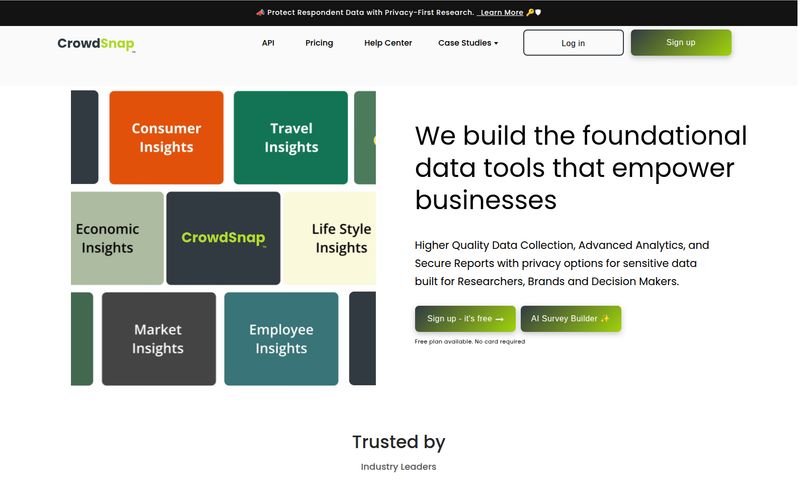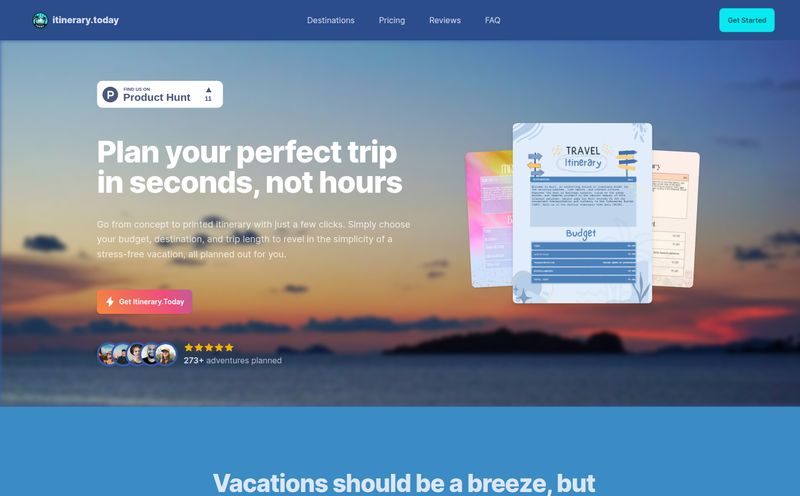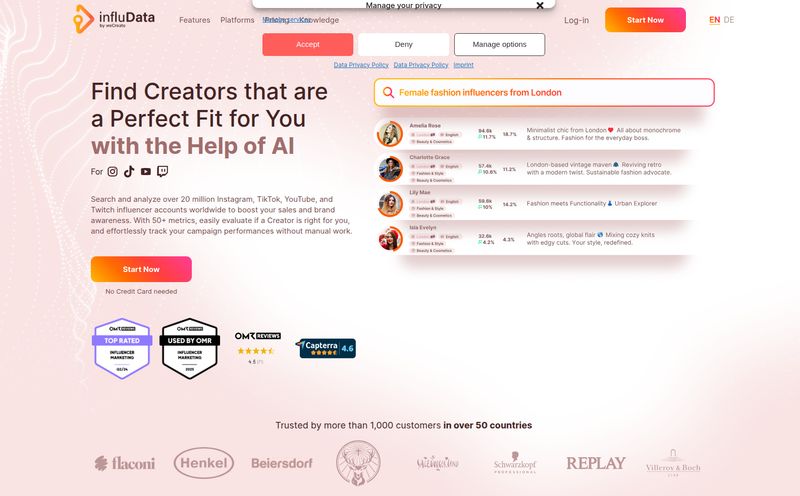We’ve all been there. You’re staring at a monster 80-page PDF report on Q3 market trends, or a competitor’s cornerstone blog post that seems to scroll into infinity. You know the answer you need is in there somewhere. So you begin the ritual dance of the desperate researcher: CTRL+F. You type “revenue growth.” Nothing. You try “Q3 earnings.” A few hits, but not the right context. “Financial performance?” Nope. An hour later, you're ten tabs deep into a thesaurus, your coffee is cold, and you've found approximately nothing useful.
It’s a frustration I know all too well from years in the SEO game. Sifting through SERP results, competitor content, and dense technical documentation is basically 70% of the job. For a long time, I just accepted CTRL+F as a clumsy but necessary evil. A hammer in a world that increasingly needs a scalpel. But what if there was a better way? I've been playing around with a tool recently that feels like it might just be that scalpel. It’s called Locus AI, and it’s making me rethink my entire research workflow.
So, What Exactly is Locus AI?
At its heart, Locus AI is a browser extension that bills itself as an “AI Co-Pilot for students and analysts.” Cute. But what it really is, in my opinion, is CTRL+F on some serious, next-level steroids. It’s not just looking for an exact string of characters you type. It uses natural language processing to understand the meaning and intent behind your question.

Visit Locus AI
More Than Just a Smarter Find-and-Replace
Think about it. You don't have to guess the exact phrasing an author used. You can just ask a question like a normal human. Instead of searching for “user acquisition cost,” you could ask, “What did they say about the cost of getting new customers?” Locus is designed to read the document and take you right to the paragraph that actually answers your question. It's a small shift in process, but the results are... well, pretty massive. It’s like having a tiny, incredibly fast research librarian whispering in your ear.
Your AI Co-Pilot for Deep Dives
But it doesn't stop at just finding stuff. That's the part that gets you in the door. The real magic happens with its other AI features. Locus can also help you synthesize the information you find. It has AI helpers that can summarize an entire webpage or PDF for you (a lifesaver!), help you brainstorm research topics based on the content, or even create digital study note cards. This turns it from a simple search tool into a genuine research partner.
My Favorite Locus AI Features (The Real Game-Changers)
Okay, so I’ve been using this for a few weeks, throwing all sorts of messy documents and websites at it. Here’s what has really stood out to me.
The Magic of Natural Language Search
This is the main event, and it works surprisingly well. I was analyzing a competitor’s whitepaper on link-building strategies. It was a beast. Instead of searching for keywords like “backlinks” or “domain authority,” I just asked Locus, “What’s their take on guest posting for authority sites?” and BAM. It took me to a section on page 27 discussing their outreach philosophy for high-tier publications. That search would have taken me ages manually. The ability to search by concept rather than keyword is just... chef's kiss.
Tackling the PDF Abyss
Let's face it, searching PDFs is a nightmare. They're often poorly formatted, non-selectable text, or just plain huge. Locus handles them with grace. The fact that the same natural language engine works on PDFs as it does on live web pages is huge. For anyone in academia, law, or any field that relies on dense, non-HTML documents, this feature alone could be worth the price of admission. No more downloading a PDF only to find it’s unsearchable.
The AI Helpers: Summarize, Brainstorm, and More
I was initially skeptical of these, thinking they’d be gimmicky. I was wrong. The summarization tool is fantastic for getting the gist of an article before committing to a full read. I used the brainstorming feature on a Google AI patent document, asking it to “suggest potential SEO implications from this,” and the ideas it kicked back were legitimately insightful. They weren’t perfect, but they were fantastic starting points that got my own creative juices flowing. A genuine time-saver.
Putting Locus AI to the Test: An SEO's Perspective
Okay, so how does this apply to my world of SEO and traffic generation? In a few pretty powerful ways. When doing competitor analysis, I can now rip through their top 10 articles in a fraction of the time, asking questions like “What are their main calls to action?” or “How do they frame their unique selling proposition?” It's also brilliant for content ideation. I can feed it a top-ranking article on a keyword I'm targeting and ask Locus to “pull out all the main subtopics discussed” or “summarize the key statistics cited in this article.” It’s like having a junior SEO assistant handling the grunt work.
Let's Talk Money: Locus AI Pricing
Alright, the all-important question: what’s this going to cost? Locus AI has a pretty straightforward pricing structure, which I appreciate. No confusing credits or weird pricing models here.
They offer a Free Plan, which is surprisingly generous. You get the smart search and AI helpers, but you're limited to 3 documents per day. This is perfect for casual users or if you just want to kick the tires and see if it fits your workflow. Honestly, for a student with occasional research papers, this might be all you ever need.
Then you have the Professional Plan. This is where things get serious. You can pay either monthly or annually.
- Professional Monthly: This runs about $9 per month.
- Professional Annually: This is a better deal at $7.50 per month (billed as $90 for the year).
Both pro plans get you everything in the free plan plus some critical upgrades: no limits on documents or searches, access to more advanced AI models (including OpenAI integration), faster processing, and the ability to personalize the AI. If you're a professional researcher, analyst, or a content-heavy SEO like myself, the upgrade is a no-brainer. The time it saves pays for itself within the first week, easily.
The Good, The Bad, and The AI-Powered
No tool is perfect, right? While I'm pretty high on Locus, let’s get into the nitty-gritty. The biggest advantage is obviously the massive boost in research productivity. It just changes the game. Using natural language feels so much more intuitive, and having it all in a browser extension means it’s right there when you need it.
On the flip side, the free plan's limitations can be hit pretty quickly if you're doing a heavy research session. Three documents isn't a lot when you're in the zone. And of course, like any AI tool, its effectiveness is only as good as the model it's running on and the quality of the source document. It can occasionally misunderstand a very complex or poorly written text. But I've found these instances to be the exception, not teh rule.
Is Locus AI Worth It for You?
So, here’s my final take. If you’re a student, an academic, a market analyst, a lawyer, or an SEO professional—basically, if your job involves reading a lot of stuff on the internet—you should absolutely give Locus AI a try. Start with the free plan. There's literally no risk. See if you like the workflow.
For me, it has carved out a permanent spot in my toolkit. It doesn’t replace my critical thinking, but it clears away the tedious underbrush of finding information, letting me spend more time actually thinking about that information. It’s a subtle but profound shift. Locus AI feels like one of those tools that, in a few years, we'll wonder how we ever lived without. It’s a smarter way to search, and I’m all for it.
Frequently Asked Questions About Locus AI
1. How is Locus AI different from just using ChatGPT?
That's a great question. While both use AI, they serve different functions. You'd have to copy and paste text into ChatGPT, and it has knowledge cutoffs. Locus AI works directly on any live webpage or PDF in your browser, in real-time. It's designed for searching and synthesizing specific documents, not for general knowledge queries.
2. Does Locus AI work on any website?
For the most part, yes. It works on the vast majority of websites and with most standard PDFs. I've yet to find a normal article or report it couldn't handle. It might struggle with highly interactive or unusually coded web applications, but for standard content, it's solid.
3. Is my data safe when I use Locus AI?
According to their privacy policy, they take user data seriously. However, as with any browser extension that reads page content, it's always smart to review the permissions and privacy policy yourself. For general research on public web pages, it’s a non-issue. I might be more cautious using it on highly sensitive internal documents.
4. Can Locus AI really understand complex or technical topics?
I’ve been pleasantly surprised. I've thrown medical studies and technical SEO documents at it, and its ability to parse jargon and find relevant sections is strong. It's not infallible, but it's significantly more effective than keyword searching for specialized subjects because it understands context and synonyms.
5. What happens if I hit my 3-document limit on the free plan?
Once you've used Locus on three separate documents (web pages or PDFs) in a day, the features will be disabled until the next day. You'll likely get a prompt inviting you to upgrade to the Professional plan for unlimited access.



